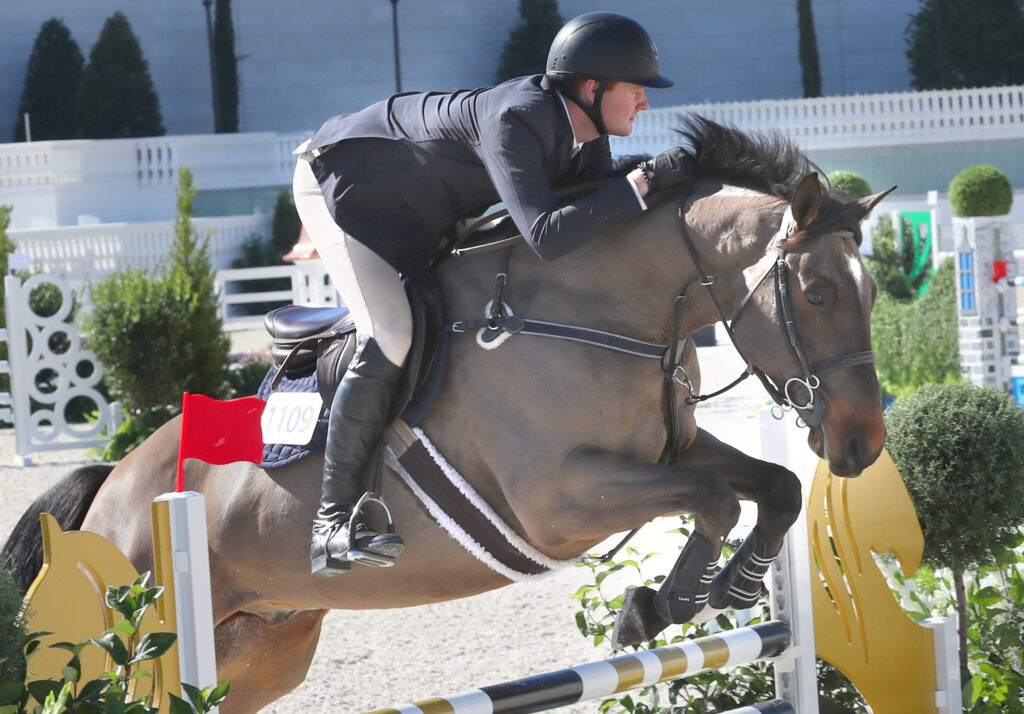Equine herpesvirus tied to World Equestrian Center

Jake Parker Wymard clears a jump with Hat Trick in the Grand Arena as they compete in the Meter 30 class during the World Equestrian Ocala Winter Spectacular. [Bruce Ackerman/Ocala Gazette]

Jake Parker Wymard clears a jump with Hat Trick in the Grand Arena as they compete at the World Equestrian Ocala Winter Spectacular in this January file photo. [Bruce Ackerman/Ocala Gazette]
Editors note: This story was updated with new information.
If a human global pandemic wasn’t enough, a recent outbreak of equine herpesvirus (EHV-1) at an Ocala horse show is prompting even more biosecurity measures.
So far, two confirmed cases of EHV-1 have been reported in horses previously stabled at the World Equestrian Center (WEC). A third suspected case came back negative for the virus, according to a Tuesday night press release from WEC.
Precautions are being taken at both Horse Shows in the Sun (HITS) and the WEC to prevent the spread. The venues are in the midst of multi-week hunter/jumper shows. No cases have been tied to HITS.
The virus can cause upper respiratory infection and fever. A large percentage of horses carry the virus. During times of stress or other issues, horses can develop an active case. In some cases, neurological symptoms can appear. Those cases are potentially fatal. The virus is spread by direct horse-to-horse contact through nasal discharge or with items contaminated by the discharge, including water buckets. It does not affect humans.
At WEC, a perimeter fence was installed around the barn where the three horses that developed symptoms were stabled. A state-ordered quarantine on the barn, which held 16 horses, was lifted after the negative test. The horses that positive for EHV-1 did not show symptoms while at the WEC, the press release stated.
The facility will not allow horses that have been at other horse competitions in the past 10 days to enter the show grounds. Only horses that will stable at the facility will be allowed to enter.
Other biosecurity measures include twice-daily temperature checks of horses and hand and feet sanitizing, according to a WEC press release.
Despite the cases, the competition will continue. The WEC Winter Spectacular runs through May 2.
HITS understands the gravity of the situation, having gone through a similar experience almost a decade ago. As the only United States Equestrian Federation sanctioned hunter/jumper show in Ocala this winter, the facility had to follow that organization’s ban on spectators because of the COVID-19 pandemic, but measures are also in place to keep horses safe at Post Time Farm, said Tom Struzzieri, HITS president and CEO.
“While there have been reports of sick horses nearby in Ocala, we have been fortunate enough to have avoided this EHV calamity as of this date,” said Struzzieri in a press release. “We are actively monitoring the arrival of horses from certain properties and limiting their entering the showgrounds. We have a strong memory of 2013 when Post Time was the facility that proved to be the lightning rod from this serious virus, and we believe we learned a great deal as horsemen from that experience and hope that this prior education helps us go forward.”
The first case of the virus in Ocala was confirmed on March 1. The affected horse was in Barn D at WEC from Feb. 17-21. It tested positive for the neurotrophic strain of the EHV-1 and began showing neurological symptoms, according to a press release from the Florida Department of Agriculture and Consumer Services.
A second horse that was in the same barn on Feb. 24 and 25, tested positive for the virus on March 3. Both horses are being treated at separate isolation facilities, according to the department of agriculture.
On March 6, a third horse from the same barn developed a fever and was sent to the University of Florida for testing and observation. That horse tested negative, according to a press release issued by the WEC.
The quarantine was lifted because the last horse to test positive left the facility about two weeks ago. The incubation period for the virus is usually four to six days but can be longer.
Other EHV-1 outbreaks have affected Europe recently. The FEI canceled international events in 10 European countries until March 28 because of an aggressive strain of the neurological form of the virus. That outbreak started in Spain and has popped up in at least three other countries, according to Horse Sport magazine.
It was not known if the European strain is related to the Ocala outbreak.
Exhibitors are doing their part to make sure their barns are free of the virus, so they can enjoy the rest of the HITS winter circuit in Ocala, which concludes March 28.
“There’s lots different with the EHV… no one new in our barn, no new horses, hand washing, keeping everything separate, lots of disinfecting and temperature taking,” Sarah Barge of Stone Lane Stables said of the steps they are taking to avoid the spread.






